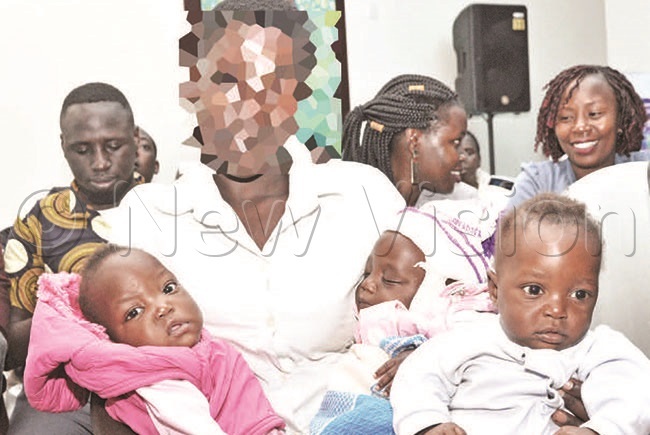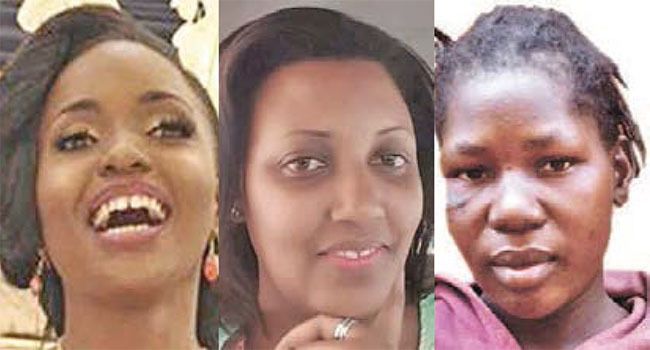Challenges women faced in 2019
Ann Nassamula, the programme manager at the Centre For Domestic Violence Prevention (CEDOVIP), says gender-based violence against women and girls was rife in 2019 despite efforts by policymakers and stakeholders to eliminate the vice.
When it comes to issues concerning women, a lot happened in 2019.
Gender-based violence, sexual abuse and exploitation
Ann Nassamula, the programme manager at the Centre For Domestic Violence Prevention (CEDOVIP), says gender-based violence against women and girls was rife in 2019 despite efforts by policymakers and stakeholders to eliminate the vice.
Gender-based violence is a phenomena deeply rooted in gender inequality and is a human rights violations. It is directed at a person because of their gender. Although both women and men experience gender-based violence, majority of the victims have been women and girls.
Nassamula notes that perpetrators came up with a new face on violence
— sexual harassment.Cases of sexual harassment at workplaces escalated. In an effort to curb the vice, a campaign, dubbed 16 Days of Activism Against Gender-Based Violence, was conducted to raise awareness.
 Phionah Namuggaya, 16, carrying her triplets
Phionah Namuggaya, 16, carrying her triplets
At places of work, many cases of sexual harassment were committed by bosses and co-workers, especially to women. There was a lot of coercion into sexual relationships, others were threatened with loss of their jobs if they did not give in. The recent case was that of personal assistants at Parliament. The vice drew a lot of attention from government officials, including the Speaker of Parliament Rebecca Kadaga, who, on May 31, met senior offi cials to discuss matters of sexual harassment on women in the Judiciary.
Violence against women also took on more sophisticated forms. An increasing number of women, for instance, reported cyber-bullying and abuse through social media. Some of the stories New Vision reported to highlight the issue included one in January, where universities spoke out on Parliament's sexual abuse report.
A Parliamentary committee had tabled a report indicating that there were at least 60 sexual predators in schools and universities.
Dr Vicky Namuggala, a lecturer at the School of Women and Gender, Makerere University, says victims need to be sensitised on how to preserve evidence for court proceedings as a way of achieving justice.
In addition, communities have to be encouraged to report cases of gender-based violence, instead of solving issues at family level. The Police and other responsible bodies should be sensitised and equipped with better skills to handle gender-specific cases correctly and urgently.
Crime/murder
Physical and emotional violence cases, with some resulting in death, continued to manifest. One such case was of Justine Kaitesi, who was beheaded by her husband, William Bizimungu, at their home in Gayaza, Wakiso district.
Other cases included the murder of Maria Nagirinya, a social worker with Community Intergrated Development Initiative and her driver Ronald Kitayimbwa. The duo were kidnapped last year on August 28 and their bodies were discovered dumped in a swamp in Nama sub-county, Mukono district, three days later.
Merian Tumukunde's murder also left the public in shock. Tumukunde was shot dead together with Joshua Nteireho Rushegera near Nambigirwa bridge along the Entebbe expressway.
 Maria Nagirinya, Merian Tumukunde and Jane Aduba
Maria Nagirinya, Merian Tumukunde and Jane Aduba
Labour exploitation
Namuggala notes that labour exploitation against women was on the rise. She cited the large number of women being taken to the Middle East and other countries as troubling. For instance, on November 7, a story was published in the New Vision, where Ugandan women were being taken to China to work as surrogate mothers. As such, Police arrested seven people, including two Chinese nationals, for smuggling women.
Additionally, the Police also intercepted several women being exported for cheap labour in the Middle East. Dr Namuggala says there is need to tighten laws governing labour export to ensure that workers are protected.
Harmful cultural practices
The barbaric practice of female genital mutilation (FGM) is still happening in some Ugandan communities. With FGM, however, genitals are cut to initiate them into adulthood.
However, rather than support their journey to adulthood, FGM endangers women and girls' health, depriving them of their fundamental human rights. The most affected communities are the Sabiny and the Pokot.
As such, a team of crime intelligence officers were dispatched to Kween district to counter the sudden upsurge of FGM. A total of 19 people were arrested, according to Rogers Taitika, the Police spokesperson for Sipi region.
Taitika said the tough penalty stipulated in the 2010 anti-FGM law drove most of the communities into silence, with many choosing to shield the perpetrators from prosecution.
"When they look at the penalties under the law and weigh it against
their culture, they would rather not report," he noted.
Sexual and reproductive health
There was increasing commitment and support by the Government to ensure that reproductive health services reach more people.
Last year marked 25 years of the ground-breaking International Conference on Population and Development (ICDP), which took place in Cairo, Egypt in 1994.
A total of 179 countries, Uganda inclusive, adopted a programme of action, recognising that reproductive health, women's empowerment and gender equality are the pathway to sustainable development.
In November last year, a number of sexual and reproductive health and rights experts, as well as 10 heads of states gathered in Nairobi, Kenya for the ICDP after 25 years. During the summit, President Yoweri Museveni made firm pronouncements to continue supporting sexual and reproductive health.
Additionally, the political commitment was that there would be more financial investments in support of women empowerment and equality in the context of social transformation.
"You cannot look at women empowerment and quality in isolation, the economy of Uganda must serve the interests of women," the President said.
In addition, Museveni said family planning would be used as an approach in protecting women's health and economic empowerment to advance the women's agenda. Religious and cultural leaders came up to strongly speak against harmful practices against women and girls.
Teenage pregnancy and school Dropouts
On November 9, New Vision published a story of 19-year-old Jane Aduba, who delivered triplets in Kayunga district, but was abandoned by the father of her sons. Aduba became part of the unacceptably high rates of teenage pregnancy.
According to the Uganda Demographic Health Survey report of 2016, teenage pregnancies in Uganda remained high at 25%. This means that for every four girls aged between 15 and 19, one is pregnant or has already had a child.
The high pregnancy rates are a result of early child marriages happening in many parts of the country where girls are often forced to marry older men. The report estimates that about 20% of girls are married before their 18th birthday. Child marriage not only jeopardies girls' rights to health, but also to education and the possibility of realising their full potential.
The high teenage pregnancy rates have consequently contributed to high rate of maternal deaths, estimated at more than 6,000 women dying during pregnancy and childbirth.
As an intervention, Ismail Mulindwa, the director of basic and secondary education in the education ministry, particularly the department of health and HIV, has urged religious leaders to embrace sexual education framework to end the high teenage pregnancy rates in the country.
He also rooted for an end to other barriers to education, such menstrual hygiene and reducing women's vulnerability to HIV/AIDS.
Mulindwa added that officials from the gender unit at the education ministry have been sensitizing communities and girls to keep in school.
According to a report released by the United Nations Education, Scientific and Cultural Organisation (UNESCO), Uganda has the highest school dropout rate at 70% in East Africa, followed by Kenya and Tanzania.
Data from the World Bank collection of development indicators, compiled from officially recognized sources in 2016, shows that primary school completion rate in Uganda stands at 52.6%. This means that for every 10 pupils who enroll for primary school, only five sit their Primary Leaving Examinations. Yet another World Bank study found that in Africa, each year of school raises average earnings by 11.3% for males and 14.5% for females.
Women losing land and property
On May 2, a story was published in the NewVision, where Paul Ociti's wife, Christine Aciro, struggled for 21 years to receive her husband's benefits. As such, Kadaga called for observance of women inheritance rights and urged institutions to uphold these rights during a youth and children's conference.
A 2015 report by the International Justice Mission indicates that 40% of widows experience actual or attempted property grabbing in their lifetime and more than 30% are victims of property grabbing.
In many cases, the widows spoke of perpetrators threatening and physically assaulting them and sometimes making attempts on their
lives and those of their children.
Moving forward 2020
Nassamula, says government needs to enforce the laws on female genital
mutilation, on commercial sex exploitation and violence against women and girls.
Nassamula notes that violence against women and girls is fueled by the attitude. So, changing attitude of the law and policymakers will help in achieving positive results.
In addition, Government needs to support nongovernmental organisation working to prevent violence against women and young girls.
Data on family planning
Uganda's modern contraceptive prevalence rate stands at 36.8%, according to the PMA 2020 survey conducted in 2018.
Data from Uganda Demographic Health Survey (UDHS) 2016 puts contraceptive uptake at 39%. This means only four out of 10 women are using contraceptives, which puts the remaining six at risk.
The UDHS survey puts the unmet need at 28% and 26%, according to the PMA 2020 survey of 2018. Unmet need means the number of women who want to use contraceptives but cannot access them. This means that three out of 10 women are willing to use contraceptives but cannot access them.
Women as the backbone of economy
Women continue to make essential contributions to the community in all its activities more than men in 2019. They took up male roles in most fields of the economy.
Gone are the days when women were not involved in any meaningful decisions in their homes, apart from bearing children and looking after them. Women were empowered through education to perform various tasks and created positive change in the society.
On April 4, the First Lady, Mrs. Janet Museveni, commissioned eight women groups in Kaweri sub-country, Kibuku district. This is the era where the status of a woman is raised through education, creating awareness, literacy and training them in different avenues that enables them to live financially independent lives.
As such, women journalists were urged to take up leadership positions at the launch of the Women in News Uganda first national gathering.
In addition, during the Women's Day celebration orgainsed by Kampala Capital City Authority at Kololo ceremonial grounds, President Yoweri Museveni urged women to form Savings and Credit Co-operative Organisations (SACCOS ) according to their skills or occupations.